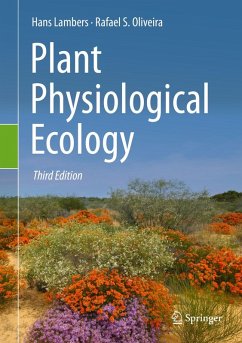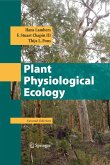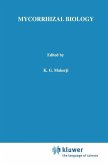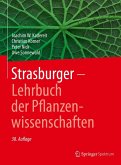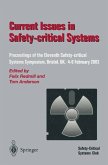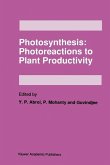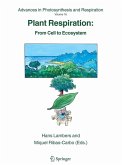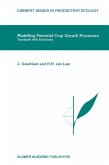56,95 €
inkl. MwSt.
Sofort per Download lieferbar

28 °P sammeln
- Format: PDF
- Merkliste
- Auf die Merkliste
- Bewerten Bewerten
- Teilen
- Produkt teilen
- Produkterinnerung
- Produkterinnerung

Bitte loggen Sie sich zunächst in Ihr Kundenkonto ein oder registrieren Sie sich bei
bücher.de, um das eBook-Abo tolino select nutzen zu können.
Hier können Sie sich einloggen
Hier können Sie sich einloggen
Sie sind bereits eingeloggt. Klicken Sie auf 2. tolino select Abo, um fortzufahren.

Bitte loggen Sie sich zunächst in Ihr Kundenkonto ein oder registrieren Sie sich bei bücher.de, um das eBook-Abo tolino select nutzen zu können.
- Geräte: PC
- ohne Kopierschutz
- eBook Hilfe
- Größe: 40.88MB
Andere Kunden interessierten sich auch für
![Plant Physiological Ecology (eBook, PDF) Plant Physiological Ecology (eBook, PDF)]() Hans LambersPlant Physiological Ecology (eBook, PDF)72,95 €
Hans LambersPlant Physiological Ecology (eBook, PDF)72,95 €![Mycorrhizal Biology (eBook, PDF) Mycorrhizal Biology (eBook, PDF)]() Mycorrhizal Biology (eBook, PDF)112,95 €
Mycorrhizal Biology (eBook, PDF)112,95 €![Strasburger - Lehrbuch der Pflanzenwissenschaften (eBook, PDF) Strasburger - Lehrbuch der Pflanzenwissenschaften (eBook, PDF)]() Joachim W. KadereitStrasburger - Lehrbuch der Pflanzenwissenschaften (eBook, PDF)79,99 €
Joachim W. KadereitStrasburger - Lehrbuch der Pflanzenwissenschaften (eBook, PDF)79,99 €![Fundamental, Ecological and Agricultural Aspects of Nitrogen Metabolism in Higher Plants (eBook, PDF) Fundamental, Ecological and Agricultural Aspects of Nitrogen Metabolism in Higher Plants (eBook, PDF)]() Fundamental, Ecological and Agricultural Aspects of Nitrogen Metabolism in Higher Plants (eBook, PDF)232,95 €
Fundamental, Ecological and Agricultural Aspects of Nitrogen Metabolism in Higher Plants (eBook, PDF)232,95 €![Photosynthesis: Photoreactions to Plant Productivity (eBook, PDF) Photosynthesis: Photoreactions to Plant Productivity (eBook, PDF)]() Photosynthesis: Photoreactions to Plant Productivity (eBook, PDF)40,95 €
Photosynthesis: Photoreactions to Plant Productivity (eBook, PDF)40,95 €![Plant Respiration (eBook, PDF) Plant Respiration (eBook, PDF)]() Plant Respiration (eBook, PDF)160,95 €
Plant Respiration (eBook, PDF)160,95 €![Modelling Potential Crop Growth Processes (eBook, PDF) Modelling Potential Crop Growth Processes (eBook, PDF)]() J. GoudriaanModelling Potential Crop Growth Processes (eBook, PDF)112,95 €
J. GoudriaanModelling Potential Crop Growth Processes (eBook, PDF)112,95 €-
-
-
Produktdetails
- Verlag: Springer International Publishing
- Seitenzahl: 736
- Erscheinungstermin: 11. Dezember 2019
- Englisch
- ISBN-13: 9783030296391
- Artikelnr.: 58414816
Dieser Download kann aus rechtlichen Gründen nur mit Rechnungsadresse in A, B, BG, CY, CZ, D, DK, EW, E, FIN, F, GR, HR, H, IRL, I, LT, L, LR, M, NL, PL, P, R, S, SLO, SK ausgeliefert werden.
- Herstellerkennzeichnung Die Herstellerinformationen sind derzeit nicht verfügbar.
Hans Lambers is an Emeritus Professor of Plant Biology at the University of Western Australia, in Perth, Australia, and a Distinguished Professor at China Agricultural University, in Beijing, China. He did his undergraduate degree at the University of Groningen, the Netherlands, followed by a PhD project on effects of hypoxia on flooding-sensitive and -tolerant Senecio species at the same institution. From 1979 to 1982, he worked as a postdoc at the University of Western Australia, Melbourne University, and the Australian National University in Australia, working on respiration and nitrogen metabolism. After a postdoc at his alma mater, he became Professor of Ecophysiology at Utrecht University, the Netherlands, in 1985, where he focused on plant respiration and the physiological basis of variation in growth rate amongherbaceous plants. In 1998, he moved to the University of Western Australia, where he focused on plant mineral nutrition, especially in legume crops and native species occurring on severely phosphorus-impoverished soils in a global biodiversity hotspot in southwestern Australia and southeastern Brazil. He has been Editor-in-Chief of the journal Plant and Soil since 1992 and featured on the first ISI list of highly cited authors in the field of animal and plant sciences (since 2002), and on several other ISI lists more recently. He was elected Fellow of the Royal Netherlands Academy of Arts and Sciences in 2003, and Fellow of the Australian Academy of Science in 2012. He received Honorary Degrees from three Universities and from the Academy of Sciences in China.
Rafael S. Oliveira is a Professor of Ecology at the University of Campinas (UNICAMP), Brazil. He did his undergraduate degree at the University of Brasília, Brazil, followed by a PhD on water relations of Amazonian and savanna trees at the University of California, Berkeley, USA. He worked as a postdoc from 2005 to 2007 at the National Institute of Space Research and the University of São Paulo in Brazil to improve the representation of key vegetation processes on climate models, followed by a project on the ecohydrology of tropical montane cloud forests. In 2007, he became Professor at UNICAMP. His research focuses on plant hydraulics, vegetation-climate feedbacks, and mineral nutrition of tropical plants. He is an Associate Editor for the journal Functional Ecology and Section Editor for Plant and Soil.
Rafael S. Oliveira is a Professor of Ecology at the University of Campinas (UNICAMP), Brazil. He did his undergraduate degree at the University of Brasília, Brazil, followed by a PhD on water relations of Amazonian and savanna trees at the University of California, Berkeley, USA. He worked as a postdoc from 2005 to 2007 at the National Institute of Space Research and the University of São Paulo in Brazil to improve the representation of key vegetation processes on climate models, followed by a project on the ecohydrology of tropical montane cloud forests. In 2007, he became Professor at UNICAMP. His research focuses on plant hydraulics, vegetation-climate feedbacks, and mineral nutrition of tropical plants. He is an Associate Editor for the journal Functional Ecology and Section Editor for Plant and Soil.
1. Assumptions and approaches.- 2. Photosynthesis, respiration, and long-distance transport.- 2a. Photosynthesis.- 2b. Respiration.- 2c. Long distance transport of assimilates.- 3. Plant water relations.- 4. Plant energy budgets: environmental effects.- 4a. The plant's energy balance.- 4b. Effects of radiation and temperature level.- 5. Scaling-up gas exchange and energy balance from the leaf to the canopy level.- 6. Mineral nutrition.- 7. Growth and allocation.- 8. Life cycles: environmental influences and adaptations.- 9. Biotic influences.- 9a. Symbiotic associations.- 9b. Ecological biochemistry: allelopathy and defense against herbivores.- 9c. Effects of microbial pathogens.- 9d. Parasitic associations.- 9e. Interactions among plants.- 9f. Carnivory.- 10. Role in ecosystem and global processes.- 10a. Decomposition.- 10b. Ecosystem and global processes: ecophysiological controls.
1. Assumptions and approaches.- 2. Photosynthesis, respiration, and long-distance transport.- 2a. Photosynthesis.- 2b. Respiration.- 2c. Long distance transport of assimilates.- 3. Plant water relations.- 4. Plant energy budgets: environmental effects.- 4a. The plant's energy balance.- 4b. Effects of radiation and temperature level.- 5. Scaling-up gas exchange and energy balance from the leaf to the canopy level.- 6. Mineral nutrition.- 7. Growth and allocation.- 8. Life cycles: environmental influences and adaptations.- 9. Biotic influences.- 9a. Symbiotic associations.- 9b. Ecological biochemistry: allelopathy and defense against herbivores.- 9c. Effects of microbial pathogens.- 9d. Parasitic associations.- 9e. Interactions among plants.- 9f. Carnivory.- 10. Role in ecosystem and global processes.- 10a. Decomposition.- 10b. Ecosystem and global processes: ecophysiological controls.
